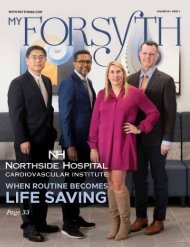My Forsyth_March 2021
Sit back and read the latest edition of your community magazine. The law firm of Patterson Moore Butler introduce their partners and lawyers, while our intern Ava Clavijo shares a few thoughts about school during extraordinary times. Check out how Irrational Kindness can make a difference in your live and the importance of knowing what to do before losing self-sufficiency. Food, health, wellness, home, life and faith are a few of the topics in this issue of My Forsyth magazine. Happy reading! Stay well
Sit back and read the latest edition of your community magazine. The law firm of Patterson Moore Butler introduce their partners and lawyers, while our intern Ava Clavijo shares a few thoughts about school during extraordinary times. Check out how Irrational Kindness can make a difference in your live and the importance of knowing what to do before losing self-sufficiency. Food, health, wellness, home, life and faith are a few of the topics in this issue of My Forsyth magazine. Happy reading! Stay well
You also want an ePaper? Increase the reach of your titles
YUMPU automatically turns print PDFs into web optimized ePapers that Google loves.
Treating<br />
Pain:<br />
IT’S A JOINT EFFORT<br />
By Miranda Reed Cleaver, D.O.<br />
Pain is an unfortunate part of life for<br />
many people. Chronic pain, defined<br />
as pain that lasts for longer than three<br />
months or pain that lasts beyond the<br />
routine time expected for healing,<br />
can be debilitating for thousands of<br />
people. Chronic pain can keep people from<br />
enjoying daily activities such a playing with<br />
children or grandchildren, attending functions<br />
such as weddings, or even enjoying a walk.<br />
Fortunately, with advancements in medicine,<br />
not everyone has to live in constant pain.<br />
Yes, it is true pain is an unfavorable part of<br />
life, but suffering does not have to be. There are<br />
many advanced techniques that physicians, in<br />
particular pain management physicians, can<br />
help perform to get people back up and running<br />
to help increase their quality of life. Most<br />
patients associate pain management physicians<br />
with medications, and this could not be further<br />
from the truth.<br />
Yes, as pain management physicians we<br />
prescribed opioids, as well as non-opioid<br />
medications to help control pain. However,<br />
this is not the only type of service we provide<br />
for patients.<br />
Pain management physicians will<br />
recommend multiple modalities for managing<br />
pain. These modalities vary and are extremely<br />
specific to the patient’s individual needs and<br />
diagnosis. Some of these recommendations<br />
can include, non-opioids, formal and homebased<br />
physical therapy, massage, chiropractic<br />
care, TENS (Transcutaneous Electrical Nerve<br />
Stimulation) Units, heat, and ice.<br />
What do you do as a patient if<br />
you have tried and failed these<br />
things? What is next? How do you<br />
approach your pain?<br />
This is where your pain management physician<br />
will usually step in to help. If you are not a<br />
surgical candidate, or you are wanting to<br />
avoid surgical treatments, your physician<br />
may recommend treatment options involving<br />
injections. Often, people hear the word needle<br />
and injection and will shutter with fear. Even<br />
though every procedure comes with risks, most<br />
procedures are relatively safe and carry a lower<br />
risk profile. These risks and benefits are well<br />
discussed between the patient and physician at<br />
office appointments.<br />
As a patient, your physician wants you to feel<br />
comfortable and ask questions. Ultimately you<br />
are responsible for your own healthcare and you<br />
need to be well informed of what is going on with<br />
your body. Your physician is happy to answer any<br />
questions to help put your mind at ease.<br />
What type of injections are we talking about?<br />
Depending on your diagnosis, your physician<br />
may speak to you about epidurals, facet<br />
injections (nerve blocks) or radiofrequency<br />
ablations, and trigger point injections, to name<br />
a few. These injections can be performed in the<br />
neck, upper, and lower back, as well as for knee<br />
or shoulder pains.<br />
If you have tried and failed the previously<br />
mentioned treatment options, where do you go<br />
from here?<br />
This is where neuromodulation or spinal<br />
cord stimulators come into play for many<br />
patients. These are sophisticated and FDA<br />
approved implantable devices that help<br />
change the way your brain perceives pain by<br />
interrupting signals from the area of your body<br />
that hurts to your brain. Do stimulators take<br />
away all your pain? No they do not.<br />
Unfortunately, being pain free is not a<br />
realistic option for most people. However, spinal<br />
cord stimulators can help keep you up and<br />
functioning at an improved capacity without<br />
putting medications into your body.<br />
You have more control over your pain<br />
because you as the patient can control your<br />
therapy settings to adjust for what you as an<br />
individual needs for your pain. Spinal cord<br />
stimulators are also trialed beforehand, so you<br />
know exactly how your body will respond before<br />
you decide to move forward with having your<br />
physician implant them. Spinal cord stimulators<br />
are not usually first line treatment for chronic<br />
pain, but they are a wonderful option for many<br />
patients in which other modalities have failed.<br />
Nothing we do as physicians can fully reverse all<br />
chronic pain issues but helping you as a patient<br />
enjoy your life to the fullest and increase your<br />
daily quality are what we strive for every day.<br />
Miranda Reed Cleaver, D.O., specializes in Pain Management<br />
Physician/Anesthesiology. Her professional interests include low back pain,<br />
cervical pain, complex regional pain syndrome, thoracic pain, knee and shoulder<br />
pain. She may be reached at 770-800-3455.<br />
34 MYFORSYTHMAG.COM VOLUME XI | ISSUE 1












